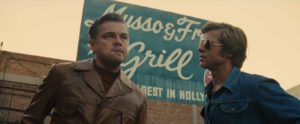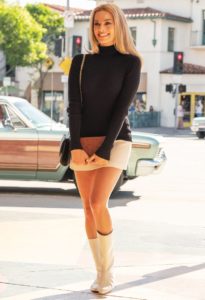The 9th film from Quentin Tarantino, aka ONCE UPON A TIME . . . IN HOLLYWOOD, takes us back to 1969, and a land of fragile dreams, transactional relationships, and the manifestation of the dark side of it all in the form of Charles Manson (Damon Herriman). Manson himself has but a cameo in the story, though his aura permeates the action, even when neither he nor his hippie minions are on screen.

Leonardo DiCaprio, Brad Pitt
The front story concerns Rick Dalton (Leonardo DiCaprio) and Cliff Booth (Brad Pitt), The former is a television star who took a shot at films, missed, and is now making the long slide to oblivion via episodic television. The latter was his stunt double when there was work, and is now his driver and general gofer. As we meet them, at Frank and Musso’s of course, Rick is being told the facts of Hollywood life by agent Marvin Schwarzs (Al Pacino), leaving Cliff to buck him up before he tucks him in at Rick’s Cielo Drive home. The one right next to the more upscale home that Sharon Tate (Margot Robbie) and Roman Polanski (Rafal Zawierucha in a jumped-up bit part) are renting. As Rick is mourning his career, Tate is basking in the nirvana of one on the rise. Neither knows what is in store.
Tarantino drenches the film in nostalgia. KHJ is always playing in the background, broadcasting not the Stones or the Beatles, but rather Neil Diamond and Paul Revere and the Raiders. Televisions hawk beauty products aimed at getting the boy of your dreams. Theater lobbies have cigarette machines. Tracking POV shots take in the view as the eternally laid-back Cliff drives the less glamorous sections of La La Land, where a waifish hippie (Margaret Qualley) keeps crossing his path before leading him to a strange interlude at the Spahn Movie Ranch. References, obvious and obscure, are flung with wild abandon. James Stacy (Timothy Olyphant) riding his motorcycle after a day of filming the pilot for Lancer may not resonate with everyone, but it’s the sort of insider code Tarantino treasures the same way he does the sudden explosion of graphic violence tinged with unexpected mirth. Even giddiness.
His Hollywood is an existential place that exists, like the careers of its denizens, only in the now, and despite the

Margot Robbie
comedy and the flashy, equally giddy camera play, there is a substantial core of melancholy, not just for the varying fortunes of our characters, but also for a culture where people are reduced to commodities whose well-being is defined by how a faceless public reacts not to them, but to the image on a screen. The shots of Robbie as Tate swallowing the unintentional slight of a fan wanting to take a photo of her brings that home, and is rendered in high contrast by the way she beams with equal parts delight and relief when a movie audience, unaware of her presence, laughs appreciatively at her performance on screen as a klutz.
As for Rick, DiCaprio invests him with the massive insecurities and pompous swagger of an actor facing the perceived ignominy of being reduced to spaghetti westerns. It is a particular and careful performance of a man who cares too much, and is brought low by the acclimation of an 8-year-old co-stars kudos on a riveting performance. A performance in a television show within the film that is, in fact, riveting.
It’s why this rambling film remains engrossing despite its digressions and diversions. The relationship between Rick and Cliff is the only real thing on screen, other than the mutual affection Cliff shares with his dog, Brandy. Even if one of those relationships a tad more co-dependent than the other. There is something touching about their bro-devotion to one another that can weather the Hollywood class system, even as the relationship between star and stunt-double refracts that between a man and his dog.
Setting a tone that is suitable for a title that includes a phrase more at home in a fairy tale, Tarantino mixes the real and imagined with cameos by Steve McQueen (Damian Lewis) exuding cool at the Playboy Mansion while fessing up about the one that got away; and Bruce Lee (Mike Moh) pontificating on the difference between martial arts and boxing before getting into a skirmish with Cliff that leave a dent on a most unfortunate place. It’s a place where anything can happen, and absurdity permeates the environment with the same relentlessness as the smog.
It all leads (eventually) to the quintessence of a Hollywood ending that is also the quintessence of wishful thinking as the sun sets on a fateful night in crime history, and the garish neon on Hollyood flickers to life. ONCE UPON A TIME . . . IN HOLLYWOOD looks squarely at all that is soul-crushing about its eponymous venue but refuses to despair. For all its ugliness, it captures the ineffable allure of a place where life can change forever blink of an eye.
Your Thoughts?